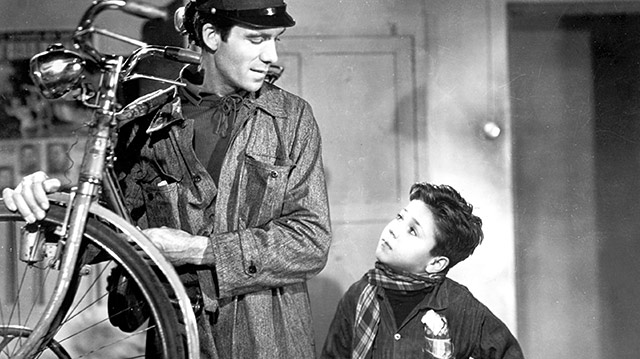
Enzo Staiola, the boy who plays the 8-year-old Bruno in the 1948 Italian film Bicycle Thieves, became a math teacher when he grew up. And why not? He had already given one of the finest performances in the history of film … and it still is today, in my humble opinion.
Recovering from minor surgery is a good excuse to catch up on movies on my must-see list, and Vittorio de Sica’s Academy Award-winning Bicycle Thieves has been on my list for a long time, since I missed it in the Sunday-night series of foreign art films at a campus theater when I was in college. (Darn that Monday morning German exam!)
Routinely voted one of the greatest films of all time, Bicycle Thieves is available to rent for $3.99 with an Amazon Prime Video membership. Money well spent to see a beautiful, soul-stirring flick.

A simple story, told in a straight, fast-moving line.
There are no flashbacks here. No multiple points of view. A poverty-stricken poster hanger in war-torn Rome has his bicycle stolen and, because the bike is essential to his job, he and his young son pursue the thief.
That’s it.
That’s the movie.
It will leave you in a puddle of tears at the end.
Using nonprofessional actors, it’s told in black and white in a super-realistic, documentary style, giving an insider’s view of post-WWII Rome … from its unemployment lines and soup kitchens to its brothels, churches and music halls. But that’s all a backdrop to the story of the father and son’s desperate, full-speed-ahead quest for the thief.

Throughout the 90-minute film, Enzo Staiola never seems to be acting. Every reaction, every smile and tear is perfectly natural.
He steals every scene, and it’s essential that he do so, because his character, Bruno, is the heart, soul and conscience of this wonderful film, which the New York Times calls “an Italian neorealistic masterpiece” with “unforgettable heartbreak and enduring pleasures.”
The joy of a gooey cheese sandwich
One of those pleasures is a scene where Bruno and his father take time out for a meal together at a restaurant well beyond their means. Bruno orders a fried mozzarella sandwich and grapples with the stringy cheese inside … under the glare of the nerdy boy seated with his bourgeois family at the next table.
(The restaurant scene is beautifully described in Chinese film director Jia Zhangke’s thoughtful 2019 analysis for The Criterion Collection.)
It’s a sweet piece of comic relief before the climax, when father and son leave the restaurant and return to the mean streets of Rome. There, Bruno’s father (admirably played by Lamberto Maggiorani) makes a decision that will shatter them both.
I won’t be a spoiler and say whether Bruno and his father pick up the pieces after that most wrenching of scenes.
You’ll have to watch for yourself … which I plan to do again over the next 48 hours before my Prime rental period runs out.
P.S. I feel sure the movie has been meat for theological discussions on the appearance of Christ in cinema. If it hasn’t, it should be. There’s fun, too, in noting how the mid-century American translation of the movie’s title to a singular The Bicycle Thief completely misses the point of the original 1946 novel by Luigi Bartolini. And how interesting it would have been to attend the stage adaptation of the film by Chicago’s Rhinoceros Theatre in 2019. Indeed, the impact of Bicycle Thieves lives on.
(Photos from The Criterion Collection on criterion.com.)